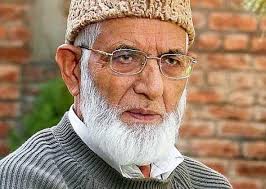Rashid Ahmed analyses politics of Syed Ali Shah Geelani and who may be his political successor.
 Some time in 2004, Mangat Ram Sharma, the then deputy chief minister of Jammu and Kashmir, spoke at a public meeting in the Ganderbal area of the Kashmir valley. Sharma, ever the man to cause political sensation with his all too candid and at times impolitic remarks, predicted that the Kashmir issue would live until the time Syed Ali Geelani was alive and that it would cease to be an issue after his death. In a way, Sharma, perhaps unknowingly, was only testifying to Geelani’s larger than life presence in the politics of the place. But at the same time, his glib observation was also a testament to how some leaders are prone to make political miscalculations. In 2016, twelve years afterward, both the Kashmir issue and Geelani, that Sharma thought stood on its last legs, continue to dominate the fractious politics of the Kashmir valley and beyond, and as the fate would have it, Sharma, in a cruel twist of irony, has been long gone from the scene, never to be heard from again.
Some time in 2004, Mangat Ram Sharma, the then deputy chief minister of Jammu and Kashmir, spoke at a public meeting in the Ganderbal area of the Kashmir valley. Sharma, ever the man to cause political sensation with his all too candid and at times impolitic remarks, predicted that the Kashmir issue would live until the time Syed Ali Geelani was alive and that it would cease to be an issue after his death. In a way, Sharma, perhaps unknowingly, was only testifying to Geelani’s larger than life presence in the politics of the place. But at the same time, his glib observation was also a testament to how some leaders are prone to make political miscalculations. In 2016, twelve years afterward, both the Kashmir issue and Geelani, that Sharma thought stood on its last legs, continue to dominate the fractious politics of the Kashmir valley and beyond, and as the fate would have it, Sharma, in a cruel twist of irony, has been long gone from the scene, never to be heard from again.
Perhaps, Sharma lacked political nuance, or perhaps it was wishful thinking, or simply he was not well versed in the history of Kashmir. If he had any inkling or if he cared to know about the past he would have known how Sheikh Mohammad Abdullah, possibly the tallest ever leader Kashmir has so far produced, championed the cause of Kashmir’s freedom for twenty two long years. Yet, his surrender in 1975, when he renounced his call for freedom to become India’s man in Kashmir, did not signal an end to the opposition to India’s presence in Kashmir. In fact, just twelve years or so after his accord with the Indian Prime Minister Indira Gandhi, the first gunshots of armed rebellion against Indian rule began to echo in the valleys of Kashmir.
Back in those early days of rebellion, several leaders, who are now at the forefront of the freedom movement, were part of Indian democratic process, while the youth of Kashmir took it upon themselves to lead the rebellion against India. At the time, Syed Ali Geelani was a member of the Jammu and Kashmir Legislative assembly. In political movements, leadership is not all about political rhetoric or posturing, it is mainly how you go about matching that rhetoric with some sort of action. And Geelani cast aside his old baggage of politics and donned a new mantle as the leading light of the separatist movement of Kashmir’s sullen and angry population. It is rather the honesty of the purpose, consistency, determination and perseverance that has elevated him in stature among a crowd of separatist leaders.
Despite his pro-Pakistan and Islamist politics, which many find hard to accept, Geelani’s name evokes admiration for the consistency of his political stance on the Kashmir dispute. Some years back I met the Gujjar spiritual leader Mian Bashir at his Baba Nagri residence in Kangan. He was all praise for Geelani. “I do not agree with his (Geelani) political or religious ideology, but I respect him as the most honest political voice in Kashmir,” said Bashir. “He has just one stand, and does not dither left and right,” he said, even while he mocked other leaders who in his words were not genuine in their commitment to the cause of Kashmir’s freedom.
In 2010, Geelani featured in a poll conducted by the website, MENSXP.com, in which he figured as one of the twenty most powerful politicians who influenced life in India. Geelani achieved an average score of 9.30 out of 10 from the voters as compared to 3.9 to the then Indian Prime Minister Dr Manmohan Singh. MENSXP.com defined octogenarian Geelani as a prominent political leader from Jammu and Kashmir and the political face of ‘Azadi’. The online magazine said Geelani’s ‘X’ factor has been his ability to lead despite surviving a renal cancer and his adamancy to court arrest and controversy for the Azadi cause. Geelani launched the “quit Kashmir” campaign in 2010 which paralyzed Kashmir for five long months with its daily street protests. His popularity has only widened while he continues to remain under house arrest at his home in Srinagar.
His appeal among a young and angry population has intensified in the last five to seven years, given his commitment to the ideas of justice and freedom that he purports to fight for in the name of his people. He is deemed as a leader who has neither caved in to temptations nor yielded to pressure, holding out to pressure in the face of continued persecution. His rigid political stance has at times caused resentment among his colleagues in the separatist camp. He has even chosen to take issue with his parent organization Jamaat-e-Islami as well. He, unlike other leaders in the separatist amalgam, refused to talk to the India government because India was not willing to call Kashmir a dispute. He argued with General Musharaf when he was the president of Pakistan over his so-called four-point formula, while other leaders traveled to Pakistan to welcome it. That made him an uncompromising leader. The failure of all these initiatives only ended up strengthening Geelani’s position and stature, as the streets echoed with the chants of ‘Geelani Wali Azadi.’
Today when his old age and frail health have begun to cause concern about the post-Geelani era, it is all but natural to wonder who would succeed Geelani. Of late, this has been a favorite subject of newspaper commentary and legions of his fans on social media. Some time back, a national newspaper of India—Telegraph—reported that Geelani was appointing his son Naeem Geelani as his successor. Ironically, the incredulous story was written by none other than the newspaper’s “roving editor” Sankarshan Thakur. Thakur is a regular Kashmir visitor and is believed to be an old Kashmir hand. He is known for his incisive reporting and elegant writing style. He was either misled by the people he depended on for information about the succession or he might have misread Geelani’s son’s home-coming. Naeem Geelani had returned from Pakistan after staying there for twelve years.
Naeem traveled to Pakistan on a valid passport to advance his career in medicine rather than hone his skills in the muck of politics. It was known to all even the Indian security agencies that he remained aloof from the political activities of Kashmiris in Pakistan. . That was perhaps the reason that the government allowed him to return home. Last week, Geelani called a press conference at his home. A word immediately went out that he is going to announce his successor. It was a mad rush outside his residence and journalists jostled with each other to stand at a vantage point to hear him announce his political heir. But he only disappointed the waiting journalists, telling them that his colleagues knew whom to turn to once he was gone. But Geelani’s strategy seemed very clear, he didn’t want the struggle to revolve around an individual but wanted it to be more broad-based with a group of people showing the way. He at the same time showed his aversion to the cult of personality and thereby affirming his principle that in a freedom movement family legacy has no place. What only mattered were the principles of justice, commitment, and sacrifice, a willingness to suffer in the cause of freedom. In power politics it is easy to rise on other person’s shoulders but a freedom movement demanded personal involvement and investment.
Without a doubt, there is no one in Kashmir to match the charisma of Geelani, to takeover from him the reins of separatist leadership. But there are many individuals who, as a group, might emerge as a likely choice. Ashraf Sahrayee, Shabir Ahmad Shah, Masarat Alam Bhat and Ghulam Nabi Sumjhi are some of the prominent faces who are known for their uncompromising and hardnosed character. I am yet to see someone as selfless as Ashraf Sahrayee. He is a fiery speaker with a vast knowledge and understanding of power, politics and religion. In Jamaat-e-Islami, he was the most sought-after speaker in public congregations, shoora meetings and other organizational businesses. For his revolutionary opinions and actions, he had always been clubbed with Geelani. Sahrayee’s only shortcoming is that he could not come out of the shadows of Geelani to grow as an individual, at least in public and media perception.
For his long spell in jails and commitment to the cause of freedom, Shabir Shah is yet another choice, who has mettle. His endurance and perseverance are beyond doubt. He is fearless but lacks initiative. Masarat Alam, as a leader, made his impression during the 2010 “quit Kashmir” movement. Their personal record of individual sacrifices make their case for leadership strong. The High Court Bar president, Mian Abdul Qayoom, is yet another man to be watched out. Qayoom led a successful campaign in 2008 to force the government to withdraw the land allotted to the Shri Amarnath Shrine Board. The land row agitation lasted for about three months during which some of the biggest ever pro-freedom rallies (at Eid Gah, TRC Ground and Pampore) were held, besides an attempt to cross the LoC with a convoy of trucks carrying fruit that had been left to rot, when the Hindu rightwing activists enforced a closure of the highway in Jammu, blocking off the Kashmir valley from the rest of the world.
Geelani might not feel it is in the interests of his faction of Hurriyat to reflect or debate the succession while he is still around, but allowing the uncertainty to linger on also creates a momentum that might later, once he is gone, become hard to bring under control. Choosing a successor, while he is still strong enough to guide him in the art of leadership, would have only added to his standing in the Kashmir valley. A leader with a vision would leave behind a legacy, but Geelani’s unwillingness to nominate one threatens to leave behind a disorder that might not bode well for the freedom movement.
The leaders like Mirwaiz umar Farooq, Yasin Malik, Professor Abdul Gani Bhat, Bilal Gani Lone, Naeem Khan could not be ignored outright. Mirwaiz represents a strong family constituency in the old city, which serves as his ready-made audience. But he is facing a strange kind of conflict. While his followers are diehard pro-Pakistan supporters, Mirwaiz is open to other ideas as well. That has made his position shaky even among his own followers. The idea of independent Kashmir propounded by the JKLF is the most popular and commonly accepted view in Kashmir. Its leaders in both camps (JKLF is divided in two factions) could exploit it to their advantage. Malik, the most popular among the JKLF leaders, has been trying to consolidate this ideological acceptance into grass-root support. In the past, he undertook two major ventures (signature campaign and Safar-e-Azadi) across the state to consolidate his support base.





